International Affairs
 |
 |
 |
 |
 |
 |
 |
Making America Socialist - Part IV
Imposing Communism on Ecuador
In my series exposing Communism’s rise to power in the Americas, I looked in-depth into the situations in Venezuela and
Bolivia, while briefly analyzing the situation in Ecuador. Today, I will examine Ecuador further, evaluating the ideology and strategies of conquest used by former president Rafael Correa, whose term lasted 10 years (2007-2017) and whose former vice-president Lenín Moreno has now assumed power over the country.
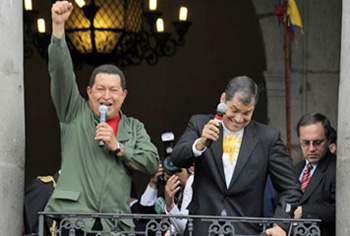 Before we dive into the analysis, it is important to note that Rafael Correa considers himself a strong Catholic: He had a progressivist formation and even served briefly as a Salesian missionary, an Order that now teaches Liberation Theology in Latin America. It is disturbing to consider that it was primarily in Catholic universities (in Ecuador and Belgium) that he received his communist formation. During his presidency, Correa reportedly
kept a picture of Pope Francis on his desk, next to pictures of prominent communists Hugo Chávez (Venezuela) and Luiz Inácio Lula da Silva (Brazil).
Before we dive into the analysis, it is important to note that Rafael Correa considers himself a strong Catholic: He had a progressivist formation and even served briefly as a Salesian missionary, an Order that now teaches Liberation Theology in Latin America. It is disturbing to consider that it was primarily in Catholic universities (in Ecuador and Belgium) that he received his communist formation. During his presidency, Correa reportedly
kept a picture of Pope Francis on his desk, next to pictures of prominent communists Hugo Chávez (Venezuela) and Luiz Inácio Lula da Silva (Brazil).
Ideology
Rafael Correa is a proponent of the ‘Socialism of the 21st century’, a term invented by Heinz Dieterich and popularized by Venezuelan dictator Chávez. He identifies his ideology with Marx and Engels, as he revealed in a 2007 interview:
“In order to advance this citizen's revolution, we need Socialism of the 21st Century. Many told us to name it ‘humanism.’ We said no, because we are not afraid of that word [Socialism]. It is with Socialism that we are going to seek justice, equity and an economy that is productive and generates employment. Our project has this name because it coincides with the Scientific Socialism of Marx and Engels.”
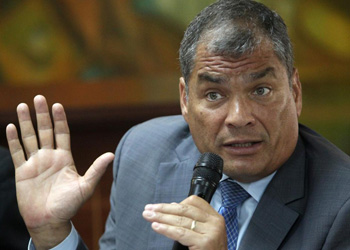 As I mentioned in previous articles (here, here and here), leftists affiliated to Spain’s socialist Podemos Party – particularly Pablo Iglesias, Juan Monedero, Alfredo Serrano and Íñigo Errejón - have helped to implement much of the Communism implanted in Latin America, which they consider to be a mere “laboratory” for communist experimentation. They have plans to implement it with successful results in Europe. This was partially accomplished through their socialist think tank, the CEPS Foundation (which I explained
here), considered by some to be an “appendix” of Podemos. When Hugo Chávez established CEPS in Venezuela, the foundation was caught in a financial corruption scheme involving the Brazilian engineering company Odebrecht, in which a large amount of money was found being funneled to Spain’s Podemos Party.
As I mentioned in previous articles (here, here and here), leftists affiliated to Spain’s socialist Podemos Party – particularly Pablo Iglesias, Juan Monedero, Alfredo Serrano and Íñigo Errejón - have helped to implement much of the Communism implanted in Latin America, which they consider to be a mere “laboratory” for communist experimentation. They have plans to implement it with successful results in Europe. This was partially accomplished through their socialist think tank, the CEPS Foundation (which I explained
here), considered by some to be an “appendix” of Podemos. When Hugo Chávez established CEPS in Venezuela, the foundation was caught in a financial corruption scheme involving the Brazilian engineering company Odebrecht, in which a large amount of money was found being funneled to Spain’s Podemos Party.
Some time later, in 2014, a similar organization called CELAG (Strategic Latin-American Center for Geopolitics) emerged in Ecuador during Correa’s presidency . The same leftists behind CEPS – Monedero, Errejón and Serrano – established CELAG. In fact, Serrano, who some say was behind the economic disaster in Venezuela, became the Executive Director of CELAG, with Rafael Correa listed as one of its “guest professors.”
Strategy of conquest: Changing the Constitution
The constitutions of Venezuela, Bolivia and Ecuador emerged in a way that seemed to be an authentic expression of the people, but in reality they were inspired and influenced by players who in many cases were not born in these nations, but are part of the external leftist current that generated the necessary mechanisms to take power. This is evidenced by the advisors of the governments that adopt ‘Socialism of the 21st Century,' Spaniards Rubén Martínez Dalmau and Roberto Viciano Pastor, who promote and steer, a “new constitutionalism” in Latin America that is allegedly based on the “direct participation of the people”:
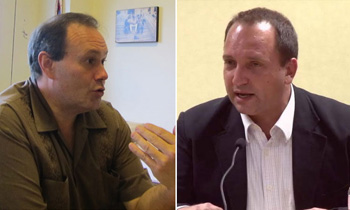 “In short, what is key to understanding the Latin American constituent resurgence is the confirmation, not only theoretical but mainly empirical, that constitutionalism as a political process of social transformation establishes Constitutions appropriate to the strength with which it emerges. …
“In short, what is key to understanding the Latin American constituent resurgence is the confirmation, not only theoretical but mainly empirical, that constitutionalism as a political process of social transformation establishes Constitutions appropriate to the strength with which it emerges. …
“We present some general features of this new constitutionalism that the latest Latin American constitutional assemblies have promoted as social-political processes of transformation, with direct participation of the people, and that... translate into fully democratic actions that will serve as a reference point in the constitutional assemblies of the future. …. Therefore, we point out the need to take into account some elements in the analysis of the origin and meaning of the new Latin American constituent assemblies and, necessarily, of their end result: the Constitutions of a new Latin American constitutionalism”.
In this excerpt, it is evident that their work has been carried out prior to the drawing up of the constitutions themselves. The starting concept is a "new Latin American constitutionalism," and the application of this idea in each country produced constitutions with few differences, all of them made from the same mold. Thus the concern rises to know where in those “processes” was the “popular participation” that they proclaim so loudly.
In Venezuela and Bolivia, as well as in Ecuador, a similar mechanism was produced to approve their respective constitutional assemblies. Since the communists did not have a majority of assembly members, they resorted to unconstitutional and illegal maneuvers to achieve their objectives. In Ecuador in 2007, not long after Correa took office, the Supreme Electoral Tribunal simply dismissed 57 of the 100 representatives of the Ecuadorian Congress. This dismantling of the legislative branch was the first step toward establishing a new Constituent Assembly where members of Correa’s socialist party, the PAIS Alliance, formed a majority.
It was Rafael Correa’s then-prime minister, Gustavo Larrea, who was in charge of instating the new representatives in an incredible violation of due process, according to journalist José Hernandez:
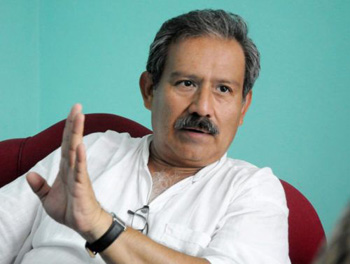 “In March 2007 he and his team were responsible for creating a majority in Congress by naming 21 replacement representatives. This political maneuver became known as “the tablecloth representatives,” which included the Supreme Electoral Tribunal: On March 9, it dismissed 57 House Representatives and allowed the government to assemble a group that, with 51 persons, voted in favor of the popular consultation that gave rise to the Constituent Assembly.
“In March 2007 he and his team were responsible for creating a majority in Congress by naming 21 replacement representatives. This political maneuver became known as “the tablecloth representatives,” which included the Supreme Electoral Tribunal: On March 9, it dismissed 57 House Representatives and allowed the government to assemble a group that, with 51 persons, voted in favor of the popular consultation that gave rise to the Constituent Assembly.
“It was a political, unconstitutional move, shameful in form, since those replacement representatives entered Congress at 5 a.m. on two buses with police guards. The same police prevented the entry of the [former] representatives. An institutional coup where replacement [police] authorities and representatives were bought. Officially this action was never investigated”.
After this coup, Correa had the majority he needed to change the Constitutent Assembly. In an article published at the time (October 10, 2007), journalist Hernando Calvo noted: “With 80 representatives out of 130, they will have an absolute majority in the Constituent Assembly. With that the Head of State will be able to ‘re-found the Republic’ and start a developmental model that will break with [capitalist] neo-liberalism.
Communication strategy
According to professors Isabel Punín Larrea and José Rúas Araujo, Correa's changes to Ecuador's media and communication policy created a situation of constant conflict between the government and the media, with the former harassing the latter:
“The arrival of Rafael Correa to the presidency of Ecuador in 2007 meant a series of changes in communication and journalistic practices. A chronological / descriptive mapping of the various government / media actions was carried out.
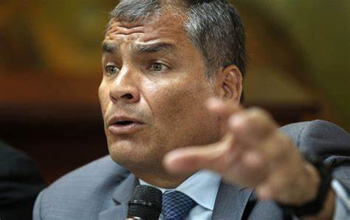 “The impact of Correa's words in the media, the transformation of the media map in Ecuador and the presidential communication strategy are being studied, taken as a reference point in the events spread by the national press.
“The impact of Correa's words in the media, the transformation of the media map in Ecuador and the presidential communication strategy are being studied, taken as a reference point in the events spread by the national press.
“The confrontations between the government and the private media create a tense environment, filled with judicial processes and unending disputes, which have changed journalistic work and, with it, the structure of the journalistic organs in the country.
“Correa's political escalation was consolidated in less than a decade. One of the factors of this rise is his use of provocative speeches that appeal to conviction and hope; resorts to the emotions of an audience harassed by propaganda, and also emphasizes that the citizen is a passive spectator of political communication.”
Finance
Rafael Correa and his newly formed País Aliance grew exponentially and won the elections against his opponent, businessman Álvaro Noboa. One question remains unsolved in this rise to power: Where did they get the money to arm a party and win the elections against the millionaire Álvaro Noboa?
According to El Comercio, the U.S. Embassy believes that Ecuadorian General René Vargas, who was close to Chavez, helped fund Correa's campaign:
“General Vargas's contacts with Chávez are direct and personal, and Vargas introduced Chávez to then Finance Minister Rafael Correa in 2005. 'Here some suspect that Vargas was the money ticket of the Venezuelan government for Correa's campaign' [said a telegram of the U. S. Embassy].
“On several occasions, the General has denied his participation in any illicit connection with Venezuela and FARC [a Colombian guerilla group]; he was, however, pointed out in the report of the Angostura Commission.”
Infobae gives more data showing that Venezuela and FARC financed the Rafael Correa campaign:
“Another report originating from the US embassy in Spain in 2006 and published this Tuesday by the Ecuadorian press indicates that José Javier Gómez-Llera, a member of the Spanish National Security Council, also mentioned a flow of money from Venezuela to Correa's campaign.
"The Spanish have seen a lot of money flying to the Correa campaign from Venezuela," says the message, which recounts communications between Gómez-Llera and María Solanas Cardin, also from the Spanish Council, with the US coordinator of Venezuela affairs, Deborah. McCarthy.”
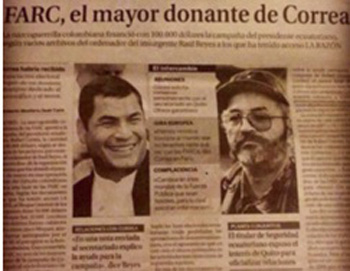 Argentine newspaper El Pais reports: “The file of the Revolutionary Armed Forces of Colombia (FARC) besieges the President of Ecuador, Rafael Correa, and has intensified relations between Bogotá and Quito. First, the computers of Raúl Reyes, number two in the guerrillas; later, a video of Mono Jojoy, his military chief, and now an alleged personal newspaper by Reyes himself account for the guerrillas' clandestine relations with the Correa team and the financing of their electoral campaign in 2006.
Argentine newspaper El Pais reports: “The file of the Revolutionary Armed Forces of Colombia (FARC) besieges the President of Ecuador, Rafael Correa, and has intensified relations between Bogotá and Quito. First, the computers of Raúl Reyes, number two in the guerrillas; later, a video of Mono Jojoy, his military chief, and now an alleged personal newspaper by Reyes himself account for the guerrillas' clandestine relations with the Correa team and the financing of their electoral campaign in 2006.
"A message from Raúl Reyes, killed in a Colombian attack against his camp in Ecuador, announced in October 2006 the contribution of $400,000 (285,000 euros). The figure coincides with the sums paid in cash on those dates into the bank account of País Alliance, the formation of then candidate Correa, and the unexplained campaign expenses before the electoral authorities”.
Spanish OK Diario gives decisive information on how CELAG was formed. It reports that the Venezuelan Supreme Court is investigating CELAG payments to Juan Carlos Monedero and Íñigo Errejón.
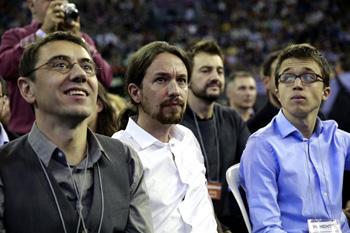 Imitating the strategy followed in Venezuela, Monedero and Errejón collaborated in creating CELAG in Ecuador to advise Correa.
Imitating the strategy followed in Venezuela, Monedero and Errejón collaborated in creating CELAG in Ecuador to advise Correa.
When the Chavist contracts signed by the CEPS Foundation in Venezuela came to light, the Podemos leadership, who were preparing to found the political party in Spain, decided to step away from the media focus and move to Ecuador.
To this day, Juan Carlos Monedero is a member of the CELAG Advisory Council, as is Rafael Correa himself, according to OKDiario.
Finally, La Nación Digital shows that Correa, in turn, passed money to the Spanish party Podemos:
"The [current] Government of Ecuador has detected important payments made from the previous government of Rafael Correa to the leadership of Podemos, transfers that would have been made by the foundation of Juan Carlos Monedero and Íñigo Errejón. All this would have originated in the Prometeo university program for which the government of Quito would have spent $54 million."
With a very Marxist cynicism, the Podemos leadership used Ibero-American countries as "guinea pigs" so they might later apply their experiments there in Spain.
Continued


Rafael Correa, right, & his Marxist model, Venezuelan dictator Hugo Chaves
Ideology
Rafael Correa is a proponent of the ‘Socialism of the 21st century’, a term invented by Heinz Dieterich and popularized by Venezuelan dictator Chávez. He identifies his ideology with Marx and Engels, as he revealed in a 2007 interview:
“In order to advance this citizen's revolution, we need Socialism of the 21st Century. Many told us to name it ‘humanism.’ We said no, because we are not afraid of that word [Socialism]. It is with Socialism that we are going to seek justice, equity and an economy that is productive and generates employment. Our project has this name because it coincides with the Scientific Socialism of Marx and Engels.”

Ex-president Rafael Correa, condemned to 8 years in prison for corruption; he asked asylum in Belgium
Some time later, in 2014, a similar organization called CELAG (Strategic Latin-American Center for Geopolitics) emerged in Ecuador during Correa’s presidency . The same leftists behind CEPS – Monedero, Errejón and Serrano – established CELAG. In fact, Serrano, who some say was behind the economic disaster in Venezuela, became the Executive Director of CELAG, with Rafael Correa listed as one of its “guest professors.”
Strategy of conquest: Changing the Constitution
The constitutions of Venezuela, Bolivia and Ecuador emerged in a way that seemed to be an authentic expression of the people, but in reality they were inspired and influenced by players who in many cases were not born in these nations, but are part of the external leftist current that generated the necessary mechanisms to take power. This is evidenced by the advisors of the governments that adopt ‘Socialism of the 21st Century,' Spaniards Rubén Martínez Dalmau and Roberto Viciano Pastor, who promote and steer, a “new constitutionalism” in Latin America that is allegedly based on the “direct participation of the people”:

Roberto Viciano, left, & Ruben Martinez, members of Podemos, drafted the new constitutions of Venezuela, Bolivia & Ecuador
“We present some general features of this new constitutionalism that the latest Latin American constitutional assemblies have promoted as social-political processes of transformation, with direct participation of the people, and that... translate into fully democratic actions that will serve as a reference point in the constitutional assemblies of the future. …. Therefore, we point out the need to take into account some elements in the analysis of the origin and meaning of the new Latin American constituent assemblies and, necessarily, of their end result: the Constitutions of a new Latin American constitutionalism”.
In this excerpt, it is evident that their work has been carried out prior to the drawing up of the constitutions themselves. The starting concept is a "new Latin American constitutionalism," and the application of this idea in each country produced constitutions with few differences, all of them made from the same mold. Thus the concern rises to know where in those “processes” was the “popular participation” that they proclaim so loudly.
In Venezuela and Bolivia, as well as in Ecuador, a similar mechanism was produced to approve their respective constitutional assemblies. Since the communists did not have a majority of assembly members, they resorted to unconstitutional and illegal maneuvers to achieve their objectives. In Ecuador in 2007, not long after Correa took office, the Supreme Electoral Tribunal simply dismissed 57 of the 100 representatives of the Ecuadorian Congress. This dismantling of the legislative branch was the first step toward establishing a new Constituent Assembly where members of Correa’s socialist party, the PAIS Alliance, formed a majority.
It was Rafael Correa’s then-prime minister, Gustavo Larrea, who was in charge of instating the new representatives in an incredible violation of due process, according to journalist José Hernandez:

Journalist Hernando Calvo describes how Correa eliminated 57 representatives of the opposition in order to make a new constitution
“It was a political, unconstitutional move, shameful in form, since those replacement representatives entered Congress at 5 a.m. on two buses with police guards. The same police prevented the entry of the [former] representatives. An institutional coup where replacement [police] authorities and representatives were bought. Officially this action was never investigated”.
After this coup, Correa had the majority he needed to change the Constitutent Assembly. In an article published at the time (October 10, 2007), journalist Hernando Calvo noted: “With 80 representatives out of 130, they will have an absolute majority in the Constituent Assembly. With that the Head of State will be able to ‘re-found the Republic’ and start a developmental model that will break with [capitalist] neo-liberalism.
Communication strategy
According to professors Isabel Punín Larrea and José Rúas Araujo, Correa's changes to Ecuador's media and communication policy created a situation of constant conflict between the government and the media, with the former harassing the latter:
“The arrival of Rafael Correa to the presidency of Ecuador in 2007 meant a series of changes in communication and journalistic practices. A chronological / descriptive mapping of the various government / media actions was carried out.

After dismantling the political opposition
Correa gagged the media
“The confrontations between the government and the private media create a tense environment, filled with judicial processes and unending disputes, which have changed journalistic work and, with it, the structure of the journalistic organs in the country.
“Correa's political escalation was consolidated in less than a decade. One of the factors of this rise is his use of provocative speeches that appeal to conviction and hope; resorts to the emotions of an audience harassed by propaganda, and also emphasizes that the citizen is a passive spectator of political communication.”
Finance
Rafael Correa and his newly formed País Aliance grew exponentially and won the elections against his opponent, businessman Álvaro Noboa. One question remains unsolved in this rise to power: Where did they get the money to arm a party and win the elections against the millionaire Álvaro Noboa?
According to El Comercio, the U.S. Embassy believes that Ecuadorian General René Vargas, who was close to Chavez, helped fund Correa's campaign:
“General Vargas's contacts with Chávez are direct and personal, and Vargas introduced Chávez to then Finance Minister Rafael Correa in 2005. 'Here some suspect that Vargas was the money ticket of the Venezuelan government for Correa's campaign' [said a telegram of the U. S. Embassy].
“On several occasions, the General has denied his participation in any illicit connection with Venezuela and FARC [a Colombian guerilla group]; he was, however, pointed out in the report of the Angostura Commission.”
Infobae gives more data showing that Venezuela and FARC financed the Rafael Correa campaign:
“Another report originating from the US embassy in Spain in 2006 and published this Tuesday by the Ecuadorian press indicates that José Javier Gómez-Llera, a member of the Spanish National Security Council, also mentioned a flow of money from Venezuela to Correa's campaign.
"The Spanish have seen a lot of money flying to the Correa campaign from Venezuela," says the message, which recounts communications between Gómez-Llera and María Solanas Cardin, also from the Spanish Council, with the US coordinator of Venezuela affairs, Deborah. McCarthy.”

The Colombian drug cartel & guerrilla movement sponsored Correa's presidential campaign in 2006
"A message from Raúl Reyes, killed in a Colombian attack against his camp in Ecuador, announced in October 2006 the contribution of $400,000 (285,000 euros). The figure coincides with the sums paid in cash on those dates into the bank account of País Alliance, the formation of then candidate Correa, and the unexplained campaign expenses before the electoral authorities”.
Spanish OK Diario gives decisive information on how CELAG was formed. It reports that the Venezuelan Supreme Court is investigating CELAG payments to Juan Carlos Monedero and Íñigo Errejón.

Foreground from left, Monedero, Iglesias & Errejón, the leaders of Podemos, received money from Correa
When the Chavist contracts signed by the CEPS Foundation in Venezuela came to light, the Podemos leadership, who were preparing to found the political party in Spain, decided to step away from the media focus and move to Ecuador.
To this day, Juan Carlos Monedero is a member of the CELAG Advisory Council, as is Rafael Correa himself, according to OKDiario.
Finally, La Nación Digital shows that Correa, in turn, passed money to the Spanish party Podemos:
"The [current] Government of Ecuador has detected important payments made from the previous government of Rafael Correa to the leadership of Podemos, transfers that would have been made by the foundation of Juan Carlos Monedero and Íñigo Errejón. All this would have originated in the Prometeo university program for which the government of Quito would have spent $54 million."
With a very Marxist cynicism, the Podemos leadership used Ibero-American countries as "guinea pigs" so they might later apply their experiments there in Spain.
Continued

Posted August 24, 2020
______________________
______________________
 Volume I |
 Volume II |
 Volume III |
 Volume IV |
 Volume V |
 Volume VI |
 Volume VII |
 Volume VIII |
 Volume IX |
 Volume X |
 Volume XI |
 Special Edition |


